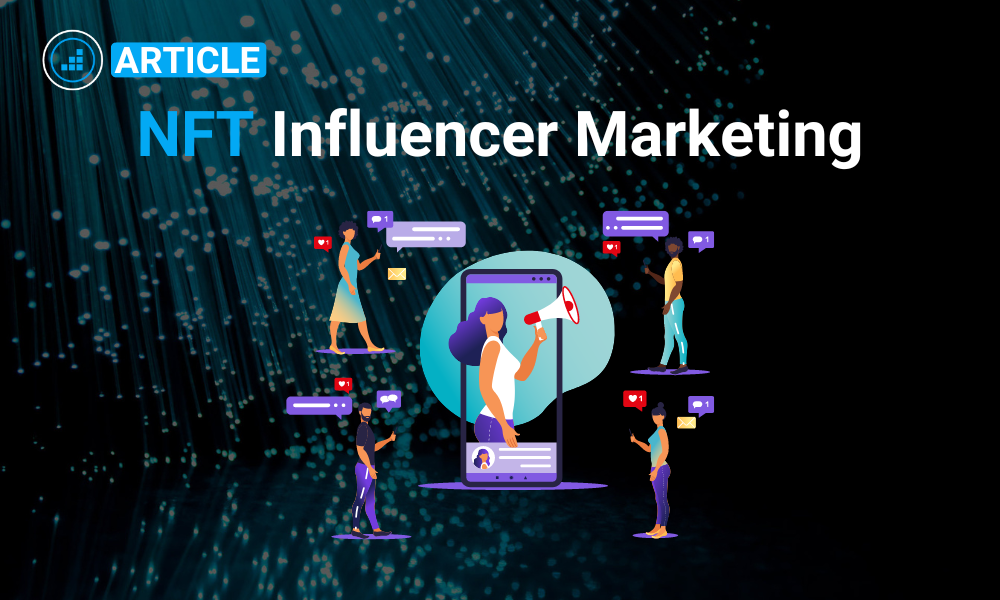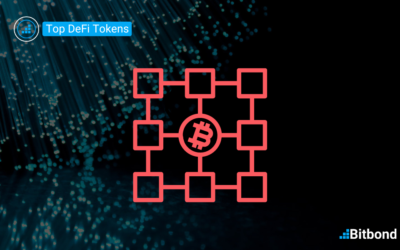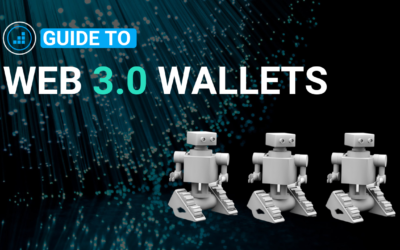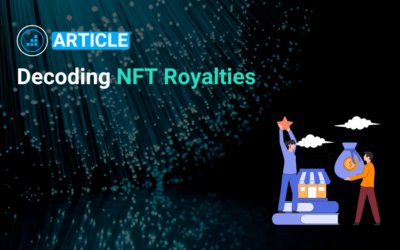Table of Contents
NFT Influencer marketing is a form of marketing that was previously known as affiliate marketing and has existed since the earliest days of the Web2-based Internet. Influencer marketing is now more closely aligned to “influencers” and “creators” online, and NFT influencer marketing is one of the most effective ways to extend the reach of your marketing efforts.
Since NFTs first appeared and then became standardized when the Ethereum ERC-721 token standard was agreed upon in 2017, NFT influencers have helped to promote and sell them in return for payment.
NFTs went mainstream in 2021, the “year of the NFT,” with trading volumes going from 33 million to 13 billion. Some NFTs sold for tens of millions of dollars at auction, and many thousands more sold in the 6- and 7-figure range.
NFT Influencers and online creators — individuals with large audiences across numerous social platforms — are an integral part of the NFT ecosystem. NFT influencer marketing is a great way to encourage the minting, buying, and selling of NFTs across Web2 and Web3 platforms.
What is NFT Influencer Marketing, and what are the benefits?
NFT influencer marketing is a blockchain-based version of influencer marketing that’s long been popular on social networks when promoting eCommerce, B2C, and Direct-to-Consumer (DTC) brands. In particular, NFT influencers have a large social media following and promote NFTs, crypto, and blockchain-based projects, usually in return for a share of the earnings.
Influencer marketing NFT is a growing trend in the world of digital art and collectibles. NFT influencers on Twitter and other social media platforms are able to reach a large and engaged audience of enthusiasts who are interested in purchasing and collecting unique digital assets. Some of the biggest NFT influencers have built up large followings on social media and are able to leverage their influence to promote new NFT projects and drive sales.
In order to effectively utilize NFT influencers in their marketing strategy, businesses and artists should carefully research and select influencers who are a good fit for their brand and have a track record of successfully promoting NFT projects to their followers. By partnering with the right NFT influencers, businesses and artists can tap into the power of social media to reach and engage with their target audience and drive sales of their NFTs.
Influencers are people with thousands, hundreds of thousands, and sometimes millions of followers across social networks. Anyone with around 5,000 to 10,000 followers can be classed as an influencer, or “micro-influencer.” You can also be classed as a “creator” if you actively create tangible or intangible assets, such as YouTube videos. Both terms are often used interchangeably.
In the Crypto, Blockchain, Web3, Metaverse, and NFT online environments, “influencers” act and operate in a similar way. Influencers are people who “have influence” over their audience in some capacity. NFT influencers use a wide range of social networks and platforms, such as Twitter, YouTube, Telegram, Instagram, and LinkedIn.
Founders wanting to raise funds for a project can create NFTs to promote/fund projects. You can work directly with NFT influencer marketing agencies or with influencers using individual contracts to promote these NFTs and raise money for your project.
For NFT marketing influencers, this is a great additional source of income. Once you’ve created social content to promote an NFT project, you can sit back and watch the money flow in. Using the Bitbond NFT Affiliate Program, NFT influencers can also earn extra income by referring users to create and mint NFTs with Token Tool.
Numerous top brands in the crypto and mainstream consumer space are leveraging NFT influencer marketing to reach new audiences, raise funding, and promote new products and services.
An NFT influencer endorsing something, or someone, such as an NFT creator (e.g., a creator who also mints NFTs), could encourage some of an influencer’s audience to buy NFTs, thereby, helping a creator sell NFTs.
NFT influencer marketing is a powerful promotional medium. Regardless of the NFTs being created or sector — sports playing cards, digital artworks, NFT versions of intellectual assets, etc. — influencers can play an essential role in promoting and selling them.
What are the benefits of NFT Influencer Marketing for Influencers and NFT creators?
NFT influencer marketing is meant to be a mutually beneficial arrangement between two parties. In the same way that influencers help brands and businesses win more customers, at the same time, influencers get paid for generating traffic, clicks, and conversions for those businesses.
For NFT creators and brands that are creating and selling NFTs, influencers can play a valuable role in marketing channels and promotional efforts. Influencers with the right audience and reach can put NFT creators and brands in front of potential customers, buyers, and people who are interested in collecting NFTs.
Influencers can get paid in a few different ways, depending on the terms agreed upon. Although in most cases, payment is in the form of commission, e.g., a percentage of the overall sale(s) secured and revenue from those.
What to consider for your influencer marketing strategy?
There are a few key steps to consider when developing an NFT influencer marketing strategy:

- Define your goals: What do you hope to achieve through your NFT influencer marketing efforts? Do you want to drive sales of a particular NFT collection, raise awareness of your brand, or something else? Clearly defining your goals will help you determine the best approach for your influencer marketing campaign.
- Research and select influencers: Identify NFT influencers who are a good fit for your brand and have a track record of successfully promoting NFT projects to their followers. Look for influencers who have a large and engaged audience, and who align with your brand values and messaging.
- Develop a clear plan: Once you have identified the influencers you want to work with, create a detailed plan outlining how you will engage with them and what you hope to achieve through the partnership. This could include creating specific content for the influencers to share with their followers, or offering them exclusive access to your NFTs.
- Communicate with influencers: Once you have a plan in place, reach out to the influencers you have selected and present your proposal. Be clear about what you are offering and what you hope to achieve through the partnership.
- Track and measure results: As your influencer marketing campaign progresses, track and measure the results to see what is working and what is not. Use this information to adjust your strategy as needed and optimize your efforts for future campaigns.
By following these steps, you can create an effective strategy that helps you reach and engage with your target audience and drive sales of your NFTs.
What are NFTs, and what are NFT Influencers?
Non-fungible tokens (NFTs) are unique Blockchain-based tokens, and unlike “fungible” tokens, they aren’t interchangeable. However, as each token is completely unique, with its own digital signature, NFTs can be traded one for the other.
Cryptocurrency, although based on the same technology, is fungible in the same way that traditional currency is. NFTs are different, and each one is inherently unique, and because the metadata and smart contracts for individual NFTs are logged and registered on the blockchain, the ownership can’t be faked, and NFTs are more resistant to cyberattacks.
NFT prices depend on the market and what individual buyers are willing to pay. Once an NFT is minted, there’s an active secondary market on NFT platforms such as OpenSea and SuperRare.
Now let’s take a look at how you can create NFTs without coding experience using Bitbond’s Token Tool. Without Token Tool, it can be difficult to program smart contracts unless you’ve got enough coding knowledge and experience to ensure you code the smart contract correctly to protect your intellectual property.
How to create NFTs with Bitbond’s Token Tool?
Bitbond’s Token Tool is a no-code NFT creating/minting tool for those who want to turn any type of tangible or intangible asset into an NFT. Remember, NFTs have numerous uses, including being the perfect way to raise funding for a project by selling NFTs, and founders can leverage NFT influencer marketing to increase token sales for their project.
Here are the six steps you need to take to turn anything into an NFT using Bitbond’s Token Tool:
- To get started, click ‘Connect Wallet’, and select your wallet and preferred Blockchain. Bitbond supports Metamask, Coinbase Wallet, and Wallet Connect.
- Decide on the asset that you want to turn into an NFT, also known as tokenizing an asset. It’s very important that you own the intellectual property of that asset.
- Choose the blockchain network you want to use to mint this NFT on (e.g., Ethereum, or using Ethereum Virtual Machine compatible protocols so that you can mint NFTs faster with lower transaction fees);
- Select the most appropriate token standard. ERC-721 is the most widely used. However, there’s also ERC-1155 and other token standards to choose from;
- Pick the market that you want to sell/list your NFT on: OpenSea (2.5% charge for every transaction), Nifty Gateway (5% fee), or SuperRare Labs (15%).
- Start tokenizing and making money from NFTs!
It’s that simple.
Top Brands leveraging NFT Influencer Marketing
According to the Influencer Marketing Hub, the top NFT influencers and brands working with them include:
- Gary Vaynerchuk (Yes, that’s right, Gary V has got into NFT influencer marketing!)
- Farokh
- Crypto Baristas
- Pranksy
- gmoney.eth
- RealMissNFT
- NFT Times
- OhhShiny
- j1mmy.eth
- The Bitcoin Express
Numerous brands have either worked with NFT influencers directly, or worked with them through an NFT influencer marketing agency. Brands include Amazon, Intuit, Crunchbase, and of course, numerous NFT and blockchain-based brands and creators.




